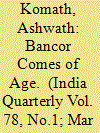| Srl | Item |
| 1 |
ID:
183859


|
|
|
|
|
| Summary/Abstract |
John Maynard Keynes proposed the concept of ‘Bancor’ in 1940 as a supranational currency that would serve as the international reserve currency. The concept did not take off at the time, despite the underlying need to liberate the international system from the hegemonic tendencies of a national currency serving as a global medium of exchange. The emergence of Bitcoin makes it possible to revive the idea of a de-nationalised global medium of exchange. This article examines the feasibility of such an idea by examining a viable state policy for adoption and use in the international realm.
|
|
|
|
|
|
|
|
|
|
|
|
|
|
|
|
| 2 |
ID:
184781


|
|
|
|
|
| Summary/Abstract |
This article looks into international cooperation based on shared religious solidarity; its causative factors, and how it influences relations between states. To demonstrate its effects in actual practice, this article examines the case study of the decision of the Indian government to revoke the special status of Kashmir in 2019, which prompted criticism by a few states, specifically Turkey and Malaysia, and also examines the role of the Organization of Islamic Cooperation (OIC). The article engages with the reasons for these states to engage in criticism of the Indian government’s decision and explores the influence of religious solidarity, especially Islamic solidarity in their rebukes against India, and also briefly deals with the implications such moves may have on a state’s foreign policy calculus.
|
|
|
|
|
|
|
|
|
|
|
|
|
|
|
|
| 3 |
ID:
176994


|
|
|
|
|
| Summary/Abstract |
Literature in Diplomatic Studies often reference a phenomenon where diplomats sent for too long to another country develop an affinity for their assigned country, sometimes to the detriment of their home country. This has profound implications when we examine diplomatic agents as personalities in their own right and their ability to perform as state agents. This article investigates the basis of such a claim by examining the Indian diplomatic corps as a case study to verify its validity and enlist the factors that influence this phenomenon. This article relies on interviews given by former diplomats of the Indian Foreign Service to highlight the structures that influence behaviour of diplomatic agents and the implications it may have on training for future diplomats and preparing them for the evolution of diplomacy in the technological age.
|
|
|
|
|
|
|
|
|
|
|
|
|
|
|
|
| 4 |
ID:
172293


|
|
|
|
|
| Summary/Abstract |
The Universal Periodic Review (UPR) has been a promising instrument in the hands of the United Nations Human Rights Council. With more emphasis on constructive criticism than an adversarial approach, it was thought that this method would help states to improve their human rights records. This article takes the case of India’s last review through this process and derives various trends and patterns of interaction with other states. It starts by outlining the process of the UPR itself and how it works procedurally, after which it highlights India’s presentation of its human rights record, and subsequently how the international community reacted to it. One of the core arguments of this article is that when it comes to human rights, it is important to analyse its politics through a regional lens since geographical continuities determine an overall outlook towards human rights and priorities that states highlight when they consider human rights records on the whole. This is further substantiated by looking at instances when bilateralism has not succeeded in its goals. It also makes certain statistical inferences after close examination of the recommendations posed by states, as well as India’s response (or lack thereof) to those recommendations. The article also highlights certain cases from India’s domestic developments to see how it plays out in the international community and their perception of India’s human rights record.
|
|
|
|
|
|
|
|
|
|
|
|
|
|
|
|